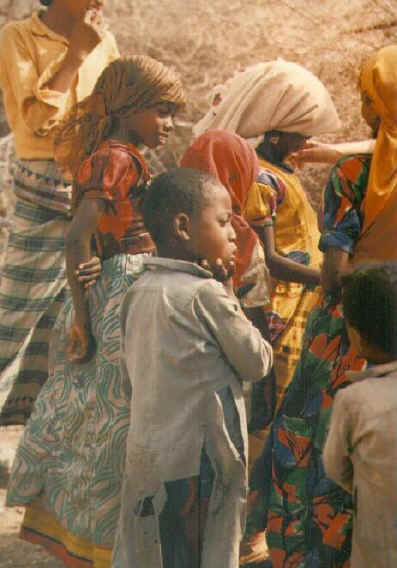2007.02.09: February 9, 2007: Headlines: Islamic Issues: COS - Yemen: Homeland Security: Staff: Washington Times: Chris is a confidential assistant to the director of the Peace Corps in Washington who studied Arabic in Egypt and Yemen
Peace Corps Online:
Directory:
Yemen:
Peace Corps Yemen:
Peace Corps Yemen: Newest Stories:
2007.02.09: February 9, 2007: Headlines: Islamic Issues: COS - Yemen: Homeland Security: Staff: Washington Times: Chris is a confidential assistant to the director of the Peace Corps in Washington who studied Arabic in Egypt and Yemen
Chris is a confidential assistant to the director of the Peace Corps in Washington who studied Arabic in Egypt and Yemen

Chris is highly proficient in Arabic reading, writing, listening, speaking and extremely knowledgeable of the Middle East, its culture and its religions. In spring 2006, before graduating from Middlebury, he applied for positions at the National Security Agency, FBI, Defense Intelligence Agency and Pentagon, and forwarded several resumes to the CIA. "I never heard back from any of the agencies. None. Not one," he tells this column. "And after I returned back from Yemen, the State Department, which paid for my fellowship, never contacted me or anybody else that was in my group, all of whom achieved advanced levels of Arabic proficiency. "Fortunately for me, I interned in the [Bush] White House in the summer of 2005, so when I graduated from Middlebury I was able to receive a schedule-C appointment focusing on international affairs. But for all those other American Arabic speakers out there including the ones that received fellowships from the State Department they are waiting to serve their country if given the chance." In the meantime, the Peace Corps says it is delighted to have Chris on board. One official there told us yesterday that one reason Chris was hired was "because of his Arabic skills and knowledge of the Middle East and Islam." Among many regions of the world, the Peace Corps serves in several Arabic-speaking countries and 15 predominantly Muslim countries.
Chris is a confidential assistant to the director of the Peace Corps in Washington who studied Arabic in Egypt and Yemen
INSIDE THE BELTWAY [Derived headline]
Feb 9, 2007
Washington Times
Who's in charge?
How many times have you seen it reported that U.S. intelligence agencies are in dire need of Americans with Arabic language skills, particularly as the war on terrorism escalates?
Just this week, Inside the Beltway wrote about Uncle Sam's concern that U.S. foreign-language deficiencies could prove deadly. We cited, for example, the FBI's backlog of untranslated audio counterterrorism materials, which nearly doubled from 2004 to 2005 to more than 8,000 hours.
Still, one has to question how anxious the federal government really is to fill its homeland security gaps.
Consider "Chris," who doesn't wish to have his last name revealed, but who is a confidential assistant to the director of the Peace Corps in Washington.
"I started studying Arabic in the fall of 2003 at Middlebury College, which is widely regarded as one of the top undergraduate institutions in America to study a foreign language. I was affected by the 9/11 attacks, and I thought that by knowing Arabic I would be able to serve my country in a beneficial way," Chris explains to Inside the Beltway.
"After the 2003-2004 academic year, I studied Arabic at a very intense level at the Middlebury College Summer Language Schools. Middlebury's Arabic summer school is regarded as the best place in the world, including the Middle East, to study the language. I then spent the entire 2004-2005 academic year studying at the American University in Cairo.
"During my entire first semester in Cairo, I only took Arabic language courses 5 Arabic courses. Upon returning to Middlebury College for my senior year, there were no Arabic courses for my level. So instead I did a one-on-one independent study with an Arabic professor, which included writing a 15-page paper in Arabic on Koranic support for a representative form of government."
In January 2006, Chris traveled to Cairo on a fellowship. There he interviewed in Arabic leaders of the Muslim Brotherhood and Hizb al-Wasat for his honors thesis, which examined the two parties' calls for an Islamic democracy in Egypt. His paper subsequently was awarded Middlebury's best thesis focusing on an international issue and was nominated for a national award.
But wait, there's more to this amazing story.
"I spent the summer of 2006 in Yemen studying Arabic at the most advanced level on a State Department Critical Languages Fellowship yes, that is correct, the U.S. government paid for me and 17 other advanced Arabic students to study at a very high level in Yemen," Chris reveals.
Obviously, Chris is highly proficient in Arabic reading, writing, listening, speaking and extremely knowledgeable of the Middle East, its culture and its religions. In spring 2006, before graduating from Middlebury, he applied for positions at the National Security Agency, FBI, Defense Intelligence Agency and Pentagon, and forwarded several resumes to the CIA.
"I never heard back from any of the agencies. None. Not one," he tells this column. "And after I returned back from Yemen, the State Department, which paid for my fellowship, never contacted me or anybody else that was in my group, all of whom achieved advanced levels of Arabic proficiency.
"Fortunately for me, I interned in the [Bush] White House in the summer of 2005, so when I graduated from Middlebury I was able to receive a schedule-C appointment focusing on international affairs. But for all those other American Arabic speakers out there including the ones that received fellowships from the State Department they are waiting to serve their country if given the chance."
Let's hope the U.S. intelligence agencies get their acts together soon enough to hire them.
In the meantime, the Peace Corps says it is delighted to have Chris on board. One official there told us yesterday that one reason Chris was hired was "because of his Arabic skills and knowledge of the Middle East and Islam." Among many regions of the world, the Peace Corps serves in several Arabic-speaking countries and 15 predominantly Muslim countries.
* John McCaslin, whose column is nationally syndicated, can be reached at 202/636-3284 or jmccaslin@washingtontimes.com.
Links to Related Topics (Tags):
Headlines: February, 2007; Islamic Issues; Peace Corps Yemen; Directory of Yemen RPCVs; Messages and Announcements for Yemen RPCVs; Homeland Security; Staff
When this story was posted in March 2007, this was on the front page of PCOL:





Peace Corps Online The Independent News Forum serving Returned Peace Corps Volunteers
 | Chris Dodd's Vision for the Peace Corps
Senator Chris Dodd (RPCV Dominican Republic) spoke at the ceremony for this year's Shriver Award and elaborated on issues he raised at Ron Tschetter's hearings. Dodd plans to introduce legislation that may include: setting aside a portion of Peace Corps' budget as seed money for demonstration projects and third goal activities (after adjusting the annual budget upward to accommodate the added expense), more volunteer input into Peace Corps operations, removing medical, healthcare and tax impediments that discourage older volunteers, providing more transparency in the medical screening and appeals process, a more comprehensive health safety net for recently-returned volunteers, and authorizing volunteers to accept, under certain circumstances, private donations to support their development projects. He plans to circulate draft legislation for review to members of the Peace Corps community and welcomes RPCV comments. |
 | He served with honor
One year ago, Staff Sgt. Robert J. Paul (RPCV Kenya) carried on an ongoing dialog on this website on the military and the peace corps and his role as a member of a Civil Affairs Team in Iraq and Afghanistan. We have just received a report that Sargeant Paul has been killed by a car bomb in Kabul. Words cannot express our feeling of loss for this tremendous injury to the entire RPCV community. Most of us didn't know him personally but we knew him from his words. Our thoughts go out to his family and friends. He was one of ours and he served with honor. |
 | Peace Corps' Screening and Medical Clearance
The purpose of Peace Corps' screening and medical clearance process is to ensure safe accommodation for applicants and minimize undue risk exposure for volunteers to allow PCVS to complete their service without compromising their entry health status. To further these goals, PCOL has obtained a copy of the Peace Corps Screening Guidelines Manual through the Freedom of Information Act (FOIA) and has posted it in the "Peace Corps Library." Applicants and Medical Professionals (especially those who have already served as volunteers) are urged to review the guidelines and leave their comments and suggestions. Then read the story of one RPCV's journey through medical screening and his suggestions for changes to the process. |
 | The Peace Corps is "fashionable" again
The LA Times says that "the Peace Corps is booming again and "It's hard to know exactly what's behind the resurgence." PCOL Comment: Since the founding of the Peace Corps 45 years ago, Americans have answered Kennedy's call: "Ask not what your country can do for you--ask what you can do for your country. My fellow citizens of the world: ask not what America will do for you, but what together we can do for the freedom of man." Over 182,000 have served. Another 200,000 have applied and been unable to serve because of lack of Congressional funding. The Peace Corps has never gone out of fashion. It's Congress that hasn't been keeping pace. |
 | PCOL readership increases 100%
Monthly readership on "Peace Corps Online" has increased in the past twelve months to 350,000 visitors - over eleven thousand every day - a 100% increase since this time last year. Thanks again, RPCVs and Friends of the Peace Corps, for making PCOL your source of information for the Peace Corps community. And thanks for supporting the Peace Corps Library and History of the Peace Corps. Stay tuned, the best is yet to come. |
 | History of the Peace Corps
PCOL is proud to announce that Phase One of the "History of the Peace Corps" is now available online. This installment includes over 5,000 pages of primary source documents from the archives of the Peace Corps including every issue of "Peace Corps News," "Peace Corps Times," "Peace Corps Volunteer," "Action Update," and every annual report of the Peace Corps to Congress since 1961. "Ask Not" is an ongoing project. Read how you can help. |
Read the stories and leave your comments.

Some postings on Peace Corps Online are provided to the individual members of this group without permission of the copyright owner for the non-profit purposes of criticism, comment, education, scholarship, and research under the "Fair Use" provisions of U.S. Government copyright laws and they may not be distributed further without permission of the copyright owner. Peace Corps Online does not vouch for the accuracy of the content of the postings, which is the sole responsibility of the copyright holder.
Story Source: Washington Times
This story has been posted in the following forums: : Headlines; Islamic Issues; COS - Yemen; Homeland Security; Staff
PCOL36490
58
I am a student in Michigan. I am studying to teach English as a second language. I am also very involved with world affairs. I have family and friends who are active duty in Iraq and I have close friends in Israel, Lebanon and Egypt. My goal is to learn arabic fluently and be able to go to egypt and teach english to those who need it most. I have found Peace Corps online by the grace of God I believe. Just as soon as I asked myself where my education would take me....I found Peace Corps. I hope that one day soon I can serve with them.

















